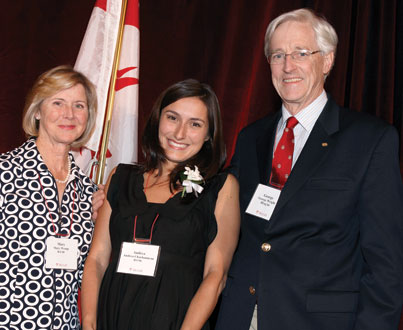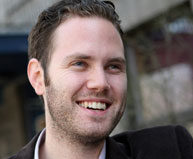Newsbites
REMEMBERING JIM

Andrea Charbonneau (centre) with Jim Wright’s sister, Mary Wemp, BA’68, and his brother, George Wright, BEng’66.
Paul Fournier
JIM WRIGHT was one of a kind. Prior to his tragic death last September, Wright, BA'65, was a beloved and long-standing volunteer at the University—a former McGill Alumni Association (MAA) president who never encountered a McGill-related cause he didn't embrace wholeheartedly.
In recognition of his dedication to his alma mater, the MAA's Honours and Awards Committee created the James G. Wright Award in his memory. Each year, the award will recognize a young alumnus who has demonstrated an exemplary commitment to voluntary service.
"We wanted the award to be for a young person who had taken initiative in the community and showed leadership and extraordinary commitment, which is the sort of thing Jim Wright did all his life," says Morna Flood Consedine, MEd'77, DEd'85, who chaired the committee seeking suitable candidates for the award.
The first recipient of the new prize was ANDREA CHARBONNEAU, BA'06, who helped start a McGill club to aid the victims of civil war in northern Uganda and turned it into a successful NGO a few years later. Charbonneau picked up the award on May 21 at the MAA's annual Honours and Awards Banquet.
Charbonneau co-founded Project Shelter Wakadogo in 2006 and now serves as the NGO's director. The organization aims to help child victims of the war between the Ugandan government and the Lord's Resistance Army, a guerrilla group accused of abducting thousands of children and then forcing them to take part in the fighting.
The project's ultimate goal is to build a community centre and school for children displaced by the war. An acre of land for the buildings was purchased this spring and construction is already underway.
"People often talked about how Jim had a special place in his heart for Africa, so we thought it would be especially fitting if we could choose an alumnus who is also contributing to development in the international community," says Flood Consedine.
For more information on Project Shelter Wakadogo, visit www.shelterwakadogo.org.
Starting points for success

Owen Egan
McGill law student ALEXANDER HERMAN had just completed his previous degree in English and history when he was struck by an uncomfortable question, one that gnaws at many a freshly minted grad: What now?
The Toronto native began chatting with long-time friends (and fellow recent grads) Paul Matthews and Andrew Feindel, who had studied filmmaking and finance, respectively, and the trio soon realized that this fretfulness cut across academic disciplines.
They began wondering just how common a feeling this 20-something trepidation might be. Specifically, did the people who are successful today ever have to go through this? And if so, what insights could they share with up-and-comers trying to figure out just which way up is?
Herman and his friends decided the best way to find out was simply to ask.
About 500 letters and scores of interviews later, the three co-authored Kickstart: How Successful Canadians Got Started (Dundurn Press). Released earlier this year, the result of their labour is a fascinating peek into how 60 Canadians—including Raffi, Angus Reid, Roberta Bondar, Brian Mulroney and Karen Kain—converted their uncertain 20s into success stories.
Although the diverse group makes for a varied set of stories, some common recommendations emerge, not the least of which are the ubiquitous four words of advice: Do what you love. "The money isn't necessarily there at first if you do what you love, but things will line up, things will work out," says Herman. Celebrated designer Bruce Mau, for example, was "living like a student until five years ago, above a convenience store, eating off a hot plate."
Herman also notes that many successful Canadians have had to engage in behaviour distinctly uncharacteristic of the national stereotype. "They were kind of pushy, and that's something that we as Canadians are a little averse to," he says. "Sometimes you need to really bug someone into helping you out—reading your script or investing in your business. You have to have a bit of nerve."


